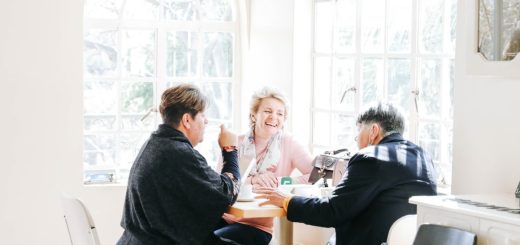Finding Groundedness in the Age of Anxiety
By Leo Babauta
We live in uncertain times.
Actually, things have always felt uncertain to the people who live in those times, but these days it might feel even more heightened, with the hyperconnectivity of the internet, social media and constant messaging, comparing ourselves to everyone else, and a very tense, divisive political situation (not just in the U.S., but in many countries).
It’s enough to drive anxiety through the roof for many people. I coach hundreds of people through my Sea Change Program and Fearless Training Program, as well as 1-on-1 … and anxiety seems to be a huge problem for many people I work with. I’ve seen it in my extended family and friend circle as well — anxiety seems to be on the rise, or at least it can feel that way to many.
So what can we do to deal with this anxiety?
There isn’t one simple solution, but there are some habits we can form to help us cope — even thrive — in the middle of chaos and uncertainty.
The Causes of Anxiety
In short, our anxiety is caused by uncertainty. It’s a feeling of alarm, of stress, of fear or even slight panic, when things feel unsettled, constantly shifting, out of control.
We feel this kind of groundlessness, this out-of-controlledness, all the time at some level. But there are times when this feeling is heightened:
- We lose our job or feel like our job is unstable
- We get into deep debt or feel like our finances are out of control
- Someone we love has a crisis (like health crisis)
- We get sick
- There’s a death in the family
- Someone we can’t stand gets elected to the leadership of our country (this has happened in multiple countries, I’m not talking about anyone in particular)
- You move to a new home in a new city
You get the idea — they’re all times of heightened uncertainty, and so the feeling of anxiety starts to increase.
The thing is, if you go through just one of these things, it’ll increase stress and maybe anxiety … but then if things calm down, you have a chance to recover. But if you’re constantly going through these kinds of things, it doesn’t give you a chance to recover. You’re constantly in a fragile state, and everything becomes more stressful.
The key is not to eliminate uncertainty and stress in your life … but instead to increase your resilience by allowing yourself to feel grounded even in the middle of a stressful, uncertain event. Then things become not such a big deal. They might stress you out a bit, but they won’t be the end of the world.
Six Habits that Lead to Groundedness
The basic habits that lead to this kind of resiliency, and a feeling of groundedness, are things you can practice every single day:
- Let ourselves feel it. When we’re feeling uncertainty, instead of rushing to solve it … or to distracting ourselves or comforting ourselves with food or shopping … we can let ourselves feel the uncertainty. I’m not talking about engaging in a narrative about what the uncertainty is like and why it’s so bad — but instead feeling it physically in your body. Where is the feeling located in your body? Can you give it some attention and curiosity? Can you stay with it for a few moments? This habit of letting ourselves feel the uncertainty and stress is transformative — every bit of anxiety becomes a place to practice, an opportunity to be present with ourselves. It becomes a chance to create a new relationship with our experience.
- Learn that it’s OK to feel groundlessness. You are feeling anxiety because of the uncertainty of your situation. But that’s because uncertainty becomes a reason to freak out. What if, instead, we learned that this groundless, uncertain feeling is actually just fine? It might not be completely pleasant, but it’s nothing to panic about. In fact, it can be an opportunity to find joy and appreciation in the groundlessness — what is there to appreciate in this feeling of complete openness? Start to shift how you see and react to this groundlessness, embracing it rather than panicking about it.
- Give ourselves love. In the middle of stress and uncertainty, instead of engaging in our old habits of shutting down or avoiding, of worrying and fretting … can we try a new habit of giving ourselves love? This is a way of being compassionate and friendly with ourselves, no matter what we’re doing. It’s like giving love to a child who is in pain — the compassion and love pour out of our hearts. Can we practice this for ourselves?
- Simplify by being fully present with one thing. We have so much going on that it can all be overwhelming. Can you simplify by focusing on just one thing right now? Trust that you’ll take care of the other things when it’s needed. Instead, be fully present with this single task. It can be something important, like working on that writing that you’ve been putting off for days. Or it can be something small, like washing this one dish, or drinking this one cup of tea. Be fully with it, and savor the experience fully. This leads to a feeling of groundedness, and helps us to not feel as frazzled.
- Find the joy in being fully present and savoring. The item above, of simplifying by doing one thing, can feel like quite a shift for many of us. It might feel like sacrifice, not constantly switching tasks and being on social media and checking phones. But it can be a way of opening up to the moment, treating yourself with a little focus, joyfully savoring whatever you’ve chosen to do with this moment of your life.
- Learn to love being resilient. Resilience is a matter of saying “No Big Deal” to any kind of uncertainty that arises, of savoring and being present, of giving ourselves love and being present with whatever uncertainty is coming up for us. Resilience is not blowing everything up to End of the World level, just because it’s not under control. Resilience is feeling grounded in the middle of chaos (even if there’s stress present), and finding a joy in being in that uncertainty. Resilience is taking a breath and then savoring that breath. It can be a wonderful thing, if you learn to love it.
Try these habits today, whenever you notice stress, anxiety, uncertainty. They take practice, but with time, they lead to a feeling of being centered and grounded.
If you’d like to practice with me, try my new Fearless Training Program — we’ll train together.


